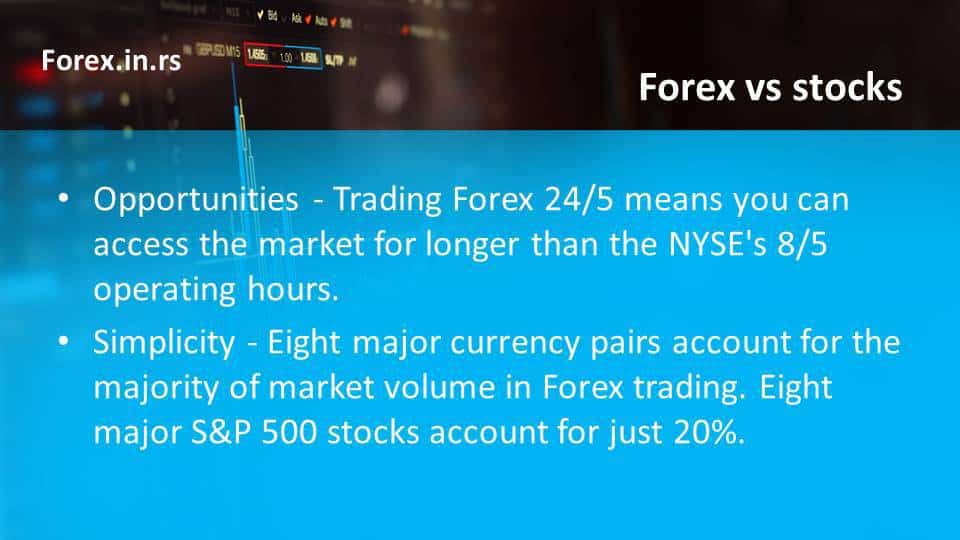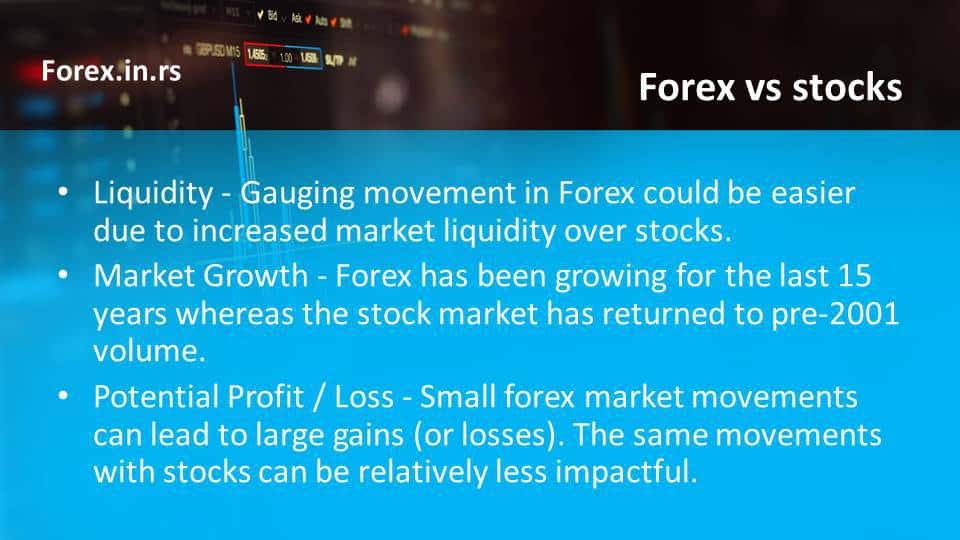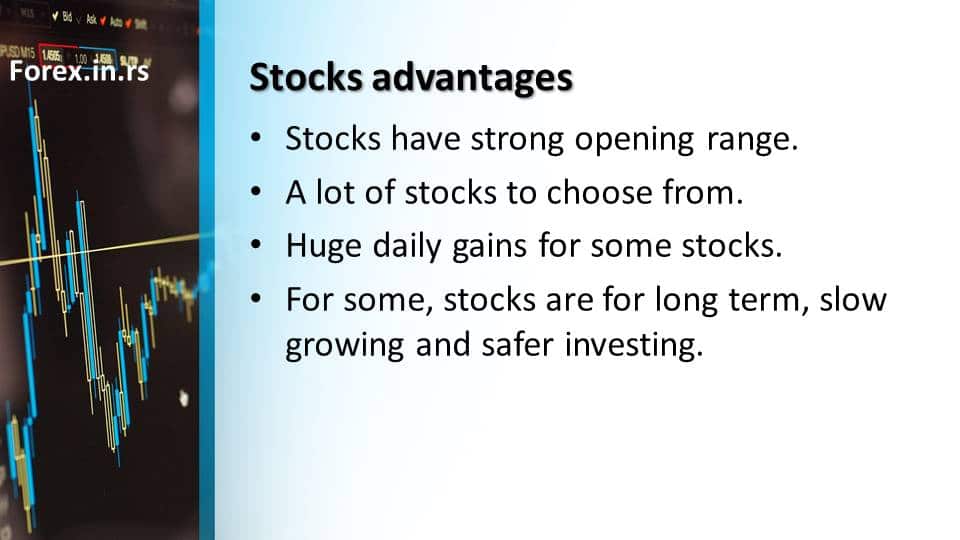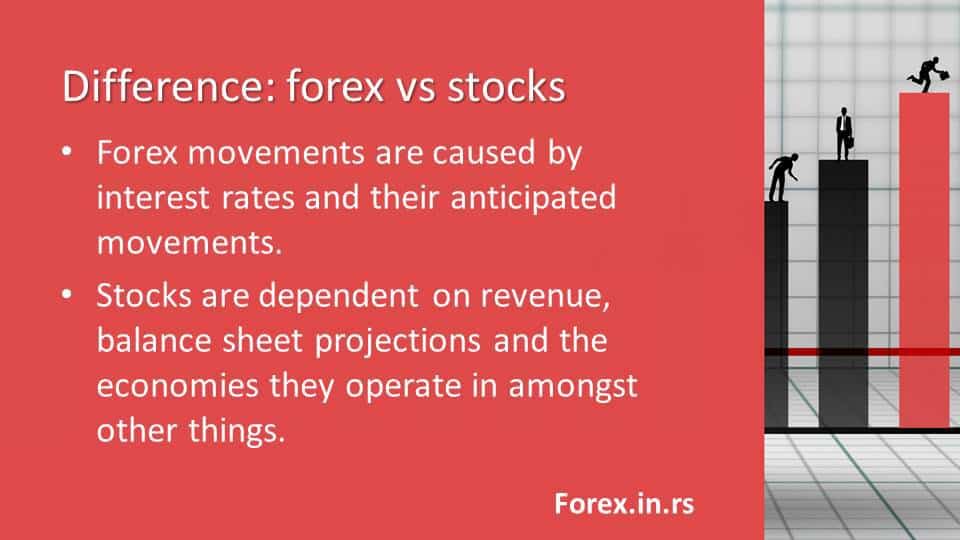Forex vs. Stocks – the difference between forex and stocks
The main difference between forex and stocks is that the forex market has high liquidity(large size around $6 Trillion per day), the stock market has less volume (Roughly $200 billion per day); that forex is a 24 Hour Market, and stocks usually 8 Hour Market; that forex has extremely low spreads and transactions costs in regards to stocks.
Is the forex and stock market the same?
Stocks and forex markets are two separate markets with different symbols, different trading sessions, but both markets are based on buying and selling asset prices. Stocks as buying and selling shares of individual companies and forex trading as currency exchange are very similar during the trade and closing. Both assets trading are based on the same principles of technical analysis. However, fundamental analysis is different for stocks and currencies.




Forex vs. stocks leverage
Forex leverage can be considered as the main reason why many traders choose forex for the stock market. Below is the comparison between stock and forex trading that one must be aware of.
There are various criteria one should meet before they do stock trading. Not every shareholder needs to be accepted for a margin account. This is what one should know about stock trading.
But this is not the case with forex trading. It is not like stock trading. To do business with leverage, one can easily sign up for a forex trading account. It would help if you chose a good forex broker. The account opening process is fairly simple. No criterion for opening an account is required. In us, one is restricted to leverage of 50:1, whereas it changes from country to country.
Forex vs. stocks liquidity variations
One important difference between forex trading and the stock market is that trading of stocks means that one is purchasing shares of organizations that may cost thousands of dollars. Due to the change in demand and supply, market-rate also differs. But if one is trading on forex, then it is completely different from above. Even though the supply of a currency in a country is changing, there is also a huge quantity of money accessible for trading.
Paired trades
So, is forex safer than stocks?
Some periods in financial markets are better for stock trading (strong rising stocks period), and some periods are better for forex trading (range stock market and strong trends in the forex market). But this usually is connected with trader strategy.
In the trading of currencies, they are estimated in pairs. You are not only worried about the economic wealth of the nation whose money is being traded and the economic wealth of the nation one is trading next to. An Individual’s worry differs from a market to another market. If one purchases Intel’s shares, their main worry is whether there will be any increment in the stock value. And one is less worried about the stock rates of other organizations. But this is not the case with forex. If one is purchasing or putting up for sale on forex, they have to think about both the nation’s economies. A winning trade on forex needs an examination of two financial entities and not examining only one entity. Forex also exhibits sensitivity to political and economic problems in different nations.
Rate sensitivity to trade movement
Stock trading and forex trading have different cost sensitivity to trade movement. Purchasing stock of ten thousand shares will have an impact on the stock rate. This is in the case of smaller organizations with fewer shares. As compared to stock trading, forex trade will have a very little or negligible impact on the currency’s market price.
There is larger freedom from guidelines.
Stock trading may have many rules and regulations on the main exchanges. But this is not the case with forex trading. There is less regulation in forex trading. This regulation and limit on major exchanges force limits which one may not likely to welcome. It also protects other investors, whereas forex does not provide all these things.
Forex vs. stocks marketplace accessibility
The stock trading market has less accessibility than currency markets. It is now easy to trade stocks twenty-four hours per day and five days a week. Also, the trading of stock is not very easy. Most investors trade with a U.S. brokerage with trading time from nine-thirty am to four pm. Due to fewer trading hours, it discourages investors. But this is not the case with forex. Investors can easily trade six days a week and twenty-four hours per day. As forex has many traders, it is always trading in different time zones.
But in forex, trading provides you to go short on a currency pair. These two positions have the same risks. Precautionary limit losses are not at all needed.
Many investors are well familiar with stock trading rather than with forex trading. The possibility of leveraging creates it simple to manage a large number of trades without any particular requirement. These are the advantages of forex trading. But taking part in forex trading also increases investment risk as well.
Forex vs. Stocks, which is more profitable?
The most common question is: forex trading vs. stock trading, which is more profitable? Stocks over the years can raise and can be a good choice for long-term investing, but forex can be profitable too (do not forget that bigger leverage can give you a bigger profit). The best thing is to specialize in some trading niche (only dow stocks, only indexes or only major forex pairs or only gold, etc.)
























